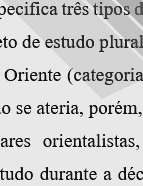

In overview, from 1873 to 1973, that is, shortly before the Portuguese Carnation Revolution and right when the last International Congress of Orientalists was held, just like the first, in Paris, as though in celebration of a centennial cycle that was drawing to a close, the Portuguese discourses on the Orient were interconnected by a range of different affinities. Taking the many ‘oriental’ spaces marked by Portugal’s influence as their object of study, among those affinities the most constant, without a shadow of a doubt, is the practice of a historiography committed to the construction of a national identity and the project of an imperial past, which reveals a disjunction between history (the past) and progress, or the specialization of knowledge. One could therefore outline a discontinuous Portuguese orientalism taking place in two distinct phases: the first occurred in the sixteenth and seventeenth centuries and was characterized by the idealization of empire, while the second began at the end of the nineteenth century and was grounded in the awareness of Portugal’s pioneering actions having opened the way for the European modernity from which the country had since been unfairly excluded. In this way, orientalism in Portugal has survived in a latent state up to the present day, anchored in a relation of ideological interdependence between national identity and history. Epistemologically interdisciplinary, assimilating contributions from other, more consolidated disciplinary fields (such as philology, history, comparative religion, anthropology, and archaeology) and gathering a range of geo-culturally specific subdisciplines around itself (Chinese studies, Japanese studies, Sanskrit studies, etc.), orientalism has benefitted from the efforts of its agents with a view to creating an interpretive community, despite the fact that this milieu has been discontinuous and, on occasion, subjugated by the interests of personal, political, and scientific agendas.
The remark made by Luís Filipe Thomaz in 1996 that “although it is the European country with the longest experience of contact with the peoples of the East, Portugal is, as far as we know, the country in which Oriental studies are the least developed” (“Estudos árabo-islâmicos”, 2012, p. 13), is the same as that made by the fin-de-siècle orientalist intellectuals at the dawn of the twentieth century. Thwarting the endeavours of these orientalists, not even a century would be enough to reverse the position of Portugal. Recent projects such as the Dicionário dos Orientalistas de Língua Portuguesa [Dictionary of Portuguese-language Orientalists] and Texts and Contexts of Portuguese Orientalism: International Congresses of Orientalists (1873-1973) (PTDC/CPC-CMP/0398/2014), already mentioned here, have recovered and given visibility to those figures, both individuals and groups who worked to insert Portugal in the networks of international orientalist debate, simultaneously revendicating the country’s pioneering role in mediating the relations between Europe and Asia in the sixteenth and seventeenth centuries.
